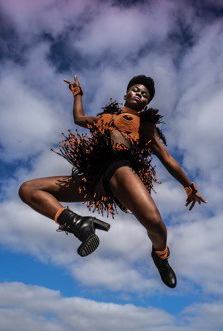I worked with In Place of War as a Fundraising Researcher during my Masters degree in Humanitarianism and Conflict Response. In Place of War was, and still is, an enigma to me. Their purpose is simple. As they state on their website, they are a “global organisation that uses creativity in places of conflict as a tool for positive change”. Yet the work In Place of War do is complex; working from an academic understanding of the link between music, theatre and peacebuilding, their focus is on enabling grassroots change-makers with access to funds, equipment or capacity-building activities. In practice, this means anything from supporting hip-hop artists in Colombia, to sourcing donated sound production equipment, to helping Ugandan people process issues of transitional justice through forum theatre. My introduction was a chance personal connection; I was speaking at Shambala Festival and so were GRRRL, In Place of War’s “international super-group of women of colour”. Hearing these women speak so energetically about using music to transform the violence into hope in their communities, I could not resist the opportunity for this placement. I was intrigued to uncover how this organisation puts theory into practice.
In Place of War are currently revising their funding model. I joined them to assist CEO Ruth Daniel in exploring philanthropy from High Net Worth individuals in the United States, as an alternative to traditional UK funding sources. I led on researching High Net Worth individuals, their personal interests, how their earned their wealth and crucially, which causes they had supported financially in the past. In some cases, assessing who might fund us was challenging, working with only scant information to gauge which aspects of In Place of War’s work might piqué a particular individual’s interest. In other cases, I had a confident instinct that that person was the right match for us and this was very rewarding. I worked from home, at flexible times to fit around my hectic University schedule, which was an ideal solution. I had opportunity to work with energetic, engaged and critical-thinking people who offered me support and encouragement. After locating thirty to forty High Net Worth individuals, Ruth and I compiled letters of introduction with newly-redesigned In Place of War promotional packs and posted them off to the US. Ruth and her team plan to meet potential funders in person in the US in Autumn.
Prior to my Masters degree, I had worked in a household-name British international non-governmental organisation (INGO) working on global poverty. We had a staff in the tens of thousands and implemented programme work in over ninety countries. In Place of War challenged my assumptions about the INGO sector. In lieu of implementing program work, In Place of War acts as a broker, facilitating the links between people engaged in peacebuilding in different geographic locations, and between them and UK funders. For this reason, In Place of War is able to be agile- it runs on a skeleton staff from a variety of small offices, kitchens and cafes. This structure enabled me to feel closer to our grassroots partner organisations in a way which was motivating. As capacities increase in the developing world, the relevance of international NGOs is increasingly brought into question. In Place of War offers its model as a radical response. It recognises its main role as broker, an advocate and a negotiator of power. Being part of this makes me feel humbled and helps me understand there is hope for the future of humanitarianism.

Holly Rothwell is currently pursuing an MA in the Humanitarianism and Conflict Response Instituteat the School of Arts, Languages and Cultureat the University of Manchester.

